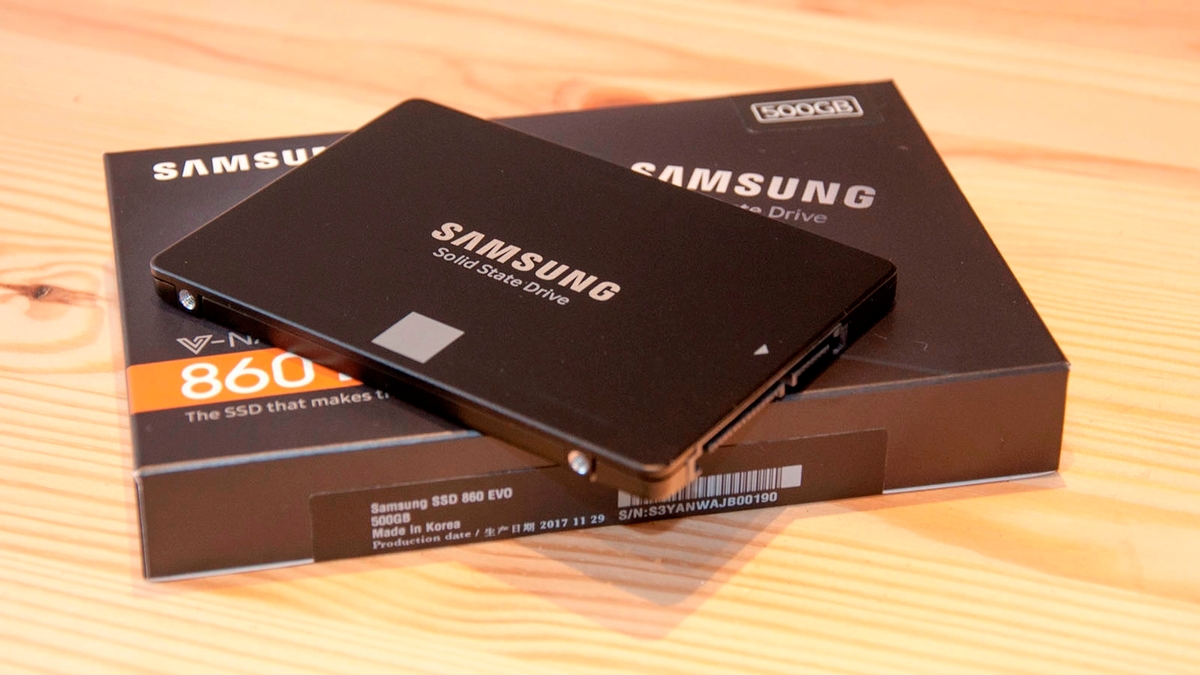Samsung 860 Evo review

Last Updated on by Daniel Lawrence
With the Samsung 850 Evo still one of the best SSDs we’ve ever used, the Samsung 860 Evo has its work cut out for it. The 850 Evo has enjoyed its prominence since it was released in December 2014 thanks to its fast speeds, tested endurance, and great value.
Thanks to its faster speeds and increased endurance, the Samsung 860 Evo succeeds in following in its footsteps. The Samsung 860 Evo is one of the best SSDs on the market right now, and both the 2.5-inch and M.2 SATA versions of it were thoroughly tested.
Samsung 860 Evo: Features
Samsung’s 860 Evo series uses 64-layer V-NAND, just as it does with its recently revamped 860 Pro SSDs. In addition, each 2TB model includes 2GB of LPDDR4 DRAM (V-NAND stands for vertical NAND, which consists of flash cells that are stacked vertically and three-dimensionally for greater density and speed).
Together, these specs allow the Samsung 860 Evo series M.2 SATA version to achieve sequential read speeds up to 560 megabytes per second (MB/s) and sequential write speeds up to 520 MB/s. 2.5-inch Samsung 860 Evo SSDs are available in only 4TB capacities, but the sequential read speed is only 550 MB/s.
With the 860 Evo, Samsung has also improved its endurance. It is typically measured in terms of Total Bytes Written, which is mostly meant to give users an idea of how long their drive will last. This is four times the endurance of Samsung’s 850 Evo, which was rated at 300TB. Samsung’s 860 Evo is rated at 1,200TB, which is four times as much capacity.
As with its predecessors, the Samsung 860 Evo series is designed to deliver a great deal of solid-state storage at an affordable price.
BENCHMARKS
Samsung 860 Evo (2TB SATA)
- CrystalDisk Mark (Sequential) Read: 562.7 MB/s; Write: 533.3 MB/s
- CrystalDisk Mark (Random) Read: 339.4 MB/s; Write: 332.9 MB/s
- 10GB File Transfer: 14.58 seconds
- 10GB Folder Transfer: 26.91 seconds
Samsung 860 Evo (2TB M.2 SATA)
- CrystalDisk Mark (Sequential) Read: 557.1 MB/s; Write: 515.9 MB/s
- CrystalDisk Mark (Random) Read: 243.7 MB/s; Write: 236.3 MB/s
- 10GB File Transfer: 13.71 seconds
- 10GB Folder Transfer: 25.63 seconds
Performance
The Samsung 860 Evo’s M.2 SATA version was not able to reach its maximum rated speed in CrystalDisk Mark when we tested it. Driver issues probably account for this, but we hope this will be resolved soon.
Aside from that, it appears nothing is hampering the performance of the M.2 SATA drive, as it was the fastest in both single file and file folder transfers by almost a full second each.
In fact, our tests revealed small but notable improvements in the Samsung 860 Evo’s performance over its predecessor. As a result, both sequential read and write speeds have improved by 5-20 MB/s. Additionally, the Samsung 860 Evo 2.5-inch version achieved 60-70 MB/s greater random read and write speeds.
Compared to an Intel SSD 540s Series SSD (2.5-inch), the Samsung SSD performs significantly better with faster speeds and is less expensive. The 500GB Samsung 860 Evo, on the other hand, sells for $169 (£169, AU$245), while the 480GB Intel drive costs $199 (£199, AU$269).
With a sequential read and write speed of over 10 MB/s and a random read and write speed of up to 20 MB/s, the Samsung 860 Pro is the king of the SATA drives. In the end, this will result in faster loading times, booting sequences, and general file transfer, though the difference will be virtually impossible to detect.
| Pros | Cons |
| Quadrupled endurance | SATA 3 protocol limits maximum potential |
| Small, but noticeable speed increases |
Conclusions
Solid-state drives such as the Samsung 860 Evo are undeniably better than their predecessors. The Samsung 860 Evo provides four times the endurance and significantly faster speeds. Even though we struggled to see the 860 Pro as much of an upgrade, Samsung has brought its budget SSD line to flagship specs – or at least as high as the aging SATA 3 standard allows.


